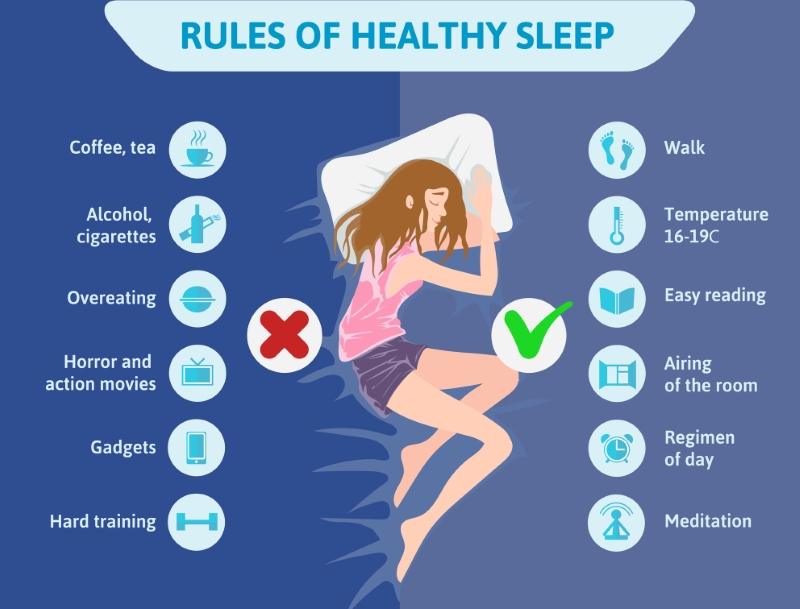Sleep Hygiene:
Sleep hygiene refers to the practices and habits that promote good sleep quality and help you get a restful night’s sleep. It includes things like maintaining a regular sleep schedule, creating a comfortable sleep environment, avoiding stimulants like caffeine close to bedtime, and establishing a relaxing bedtime routine. Good sleep hygiene can improve the quality of your sleep and overall well-being. If you have trouble sleeping, practicing good sleep hygiene can make a big difference
What Affect Sleep Hygiene?
Various factors can affect sleep hygiene. Some common influences include:
- Stress and Anxiety: High levels of stress and anxiety can disrupt sleep patterns and make it difficult to fall asleep or stay asleep.
- Screen Time: Using electronic devices before bed can interfere with the body’s production of melatonin, a hormone that regulates sleep.
- Caffeine and Stimulants: Consuming caffeine or other stimulants close to bedtime can make it harder to fall asleep.
- Sleep Environment: Factors like noise, light, temperature, and comfort of your sleep environment can impact the quality of your sleep.
- Bedtime Routine: Having a relaxing bedtime routine can promote better sleep by signaling to your body that it’s time to wind down.
Understanding Your Body Signals:
Understanding your body signals is essential for maintaining good sleep hygiene. Your body clock, also known as the circadian rhythm, is like an internal clock that regulates your sleep-wake cycle and other important bodily functions.
Your body signals are influenced by external factors like light and darkness, which help signal your body when it’s time to be awake and when it’s time to sleep. By understanding your body language and establishing a consistent sleep schedule that aligns with your natural circadian rhythm, you can improve the quality of your sleep.
Factors like exposure to natural light during the day, avoiding bright screens before bed, and maintaining a regular sleep routine can all help regulate your body signals and promote better sleep. Listening to your body’s natural cues and following a consistent sleep schedule can help optimize your sleep patterns and overall well-being.
Your Sleeping Atmosphere:
Creating a conducive sleeping atmosphere is crucial for good sleep hygiene. Your sleeping environment plays a significant role in the quality of your sleep. Here are some tips to optimize your sleeping atmosphere:
- Lighting: Keep your bedroom dark and use curtains or blinds to block out external light. Darkness signals your body that it’s time to sleep.
- Temperature: Maintain a comfortable temperature in your bedroom, typically on the cooler side, as a cooler environment can promote better sleep.
- Noise: Minimize disruptive noises by using earplugs, white noise machines, or soundproofing your room if needed.
- Comfort: Invest in a comfortable mattress and pillows that support your body and help you relax.
- Clutter: Keep your bedroom free of clutter and create a calming, organized space that promotes relaxation.
Avoiding Unhealthy Activities:
Such factors can harm your sleeping hygiene also:
- Alcohol: even though it might make you feel relaxed initially, can disrupt your sleep cycle, leading to fragmented and poor-quality sleep. This can leave you feeling tired and less alert the next day, impacting your overall productivity and well-being.
- Drugs: on the other hand, can have severe consequences on your physical and mental health. They can lead to addiction, health problems, and impair your judgment and decision-making abilities, affecting various aspects of your life.
- Sleeping pills: may offer a temporary solution for sleep troubles, but relying on them regularly can disrupt your natural sleep patterns and make it harder for your body to fall asleep on its own. Over time, this dependency can lead to more significant sleep issues.
- Junk food: while satisfying in the moment, lacks essential nutrients and can leave you feeling sluggish and low on energy. A diet high in junk food can contribute to weight gain, poor digestion, and overall decreased well-being.
Calm Your Mind:
To calm your mind for better sleep hygiene, it’s helpful to establish a relaxing bedtime routine. You can start by creating a calm environment in your bedroom, dimming the lights, and avoiding screens like phones or laptops before bed. Engaging in soothing activities like reading a book, taking a warm bath, or practicing gentle yoga can signal to your body that it’s time to wind down. Deep breathing exercises or meditation can also help quiet your mind and prepare you for sleep. Developing a consistent bedtime routine can train your body to recognize when it’s time to rest, leading to improved sleep quality.
Other Factors:
- Consistent Sleep Schedule: It’s important to go to bed and wake up at the same time every day, even on weekends. This helps regulate your body’s internal clock, making it easier to fall asleep and wake up naturally.
- Comfortable Sleep Environment: Create a sleep-friendly environment by keeping your bedroom dark, quiet, and cool. Use comfortable bedding and ensure your mattress and pillows are supportive.
- Bedtime Routine: Establish a relaxing bedtime routine to signal your body that it’s time to wind down. This could include activities like reading a book, taking a warm bath, or practicing relaxation techniques like deep breathing.
- Limit Stimulants: Avoid stimulants like caffeine, nicotine, and heavy meals close to bedtime. These can interfere with your ability to fall asleep.
- Limit Screen Time: Reduce exposure to screens (phones, tablets, computers) before bed as the blue light emitted can disrupt your sleep cycle. Try to disconnect at least an hour before bedtime.
- Physical Activity: Regular exercise can improve sleep quality, but try to avoid vigorous exercise close to bedtime as it may be stimulating.
- Manage Stress: Practice stress-reducing techniques like meditation, yoga, or journaling to help calm your mind before bed.
Here is some info about sleep hygiene. Stay connected for further informative articles.
By using this site, you agree to the Terms and conditions and Privacy Policy of https://beautyvitalityco.com/
Previous post: https://beautyvitalityco.com/obesity-types-causes-treatment/




1 Comment
Diabetes (DM): Types, Symptoms, Treatment And Diagnosis |/2222 - Beauty Vitality Co · July 23, 2024 at 2:51 pm
[…] Previous post: https://beautyvitalityco.com/what-is-sleep-hygiene/ […]